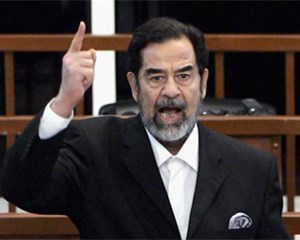After the Gulf war in 1991, sanctions imposed by the international community banned all trade with Iraq except in humanitarian circumstances. Among many hardships, this made it difficult for artists and sculptors to access materials. One way to get paint, canvas, bronze and stone was to paint pictures or make sculptures of Saddam. If the art was right, the regime would provide. While the Iraqi people suffered under sanctions, Saddam built vast palaces filled with monuments to himself. It is unclear how many statues of himself Saddam put up in this period, though there were hundreds in Baghdad alone.
1991年海湾战争后,国际社会实施制裁,禁止与伊拉克进行除人道主义之外的所有贸易。面对这些困难,艺术家们和雕塑家们很难获得材料。而有一种办法可以拿到颜料、画布、青铜和石头,那就是为萨达姆画像或雕刻雕像。政府只支持正确的艺术。当伊拉克人民饱受制裁之苦时,萨达姆建造了巨大的宫殿,里面全是他自己的纪念碑。虽然仅在巴格达就有数百座萨达姆雕像,但目前尚不清楚在这一时期建造了多少座萨达姆雕像。
There was nothing special about the statue of Saddam that was put up in Firdos Square in April 2002 to mark his 65th birthday. Firdos Square is not the most important location in Baghdad, and the statue was unexceptional: a bronze standing figure, 12 metres high, weighing around a tonne. The fact that it was not a big deal may be one reason why, since its destruction, there has been confusion as to who made it.
2002年4月,为纪念萨达姆65岁生日,政府在佛多斯广场建造了一座萨达姆雕像,这座雕像并没有什么特别之处。佛多斯广场并不是巴格达最重要的地方,而这座雕像也很普通:一座高12米、重约1吨的青铜雕像。也许就是因为它很普通,所以自它被摧毁以来,人们一直对建造它的人感到困惑。

At least two different sculptors have been credited with creating this statue, with two different narratives. This is characteristic of the story of Saddam's statue in Firdos Square. The boundary between what is real and what is fake would soon disappear altogether.
至少有两位不同的雕刻家参与建造了这座雕像,关于它的故事有两种版本。这就是佛多斯广场萨达姆雕像故事的特点。真假之间的界限很快就会完全消失。
The French philosopher Jean Baudrillard defined hyperreality as a state in which you cannot tell the difference between reality and a simulation of reality. In 1991, at the time of the first Gulf war, he wrote three essays touching on this theme, later published together as The Gulf War Did Not Take Place. Baudrillard argued that the relevant events in the first couple of months of 1991 were not really a war, in the sense that "war" was commonly understood: they were a simulation of a war.
法国哲学家让·鲍德里亚将超现实定义为一种无法区分现实和模拟现实的状态。1991年第一次海湾战争爆发时,他写了三篇关于该主题的文章,后来一起发表为《海湾战争没有发生》。鲍德里亚认为,1991年前几个月的相关事件并不是一场真正的战争,就“战争”这个概念而言:它们是一场模拟战争。











